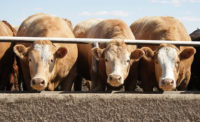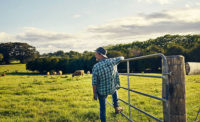Farm to Plate
AHA: Reclaiming the word 'humane'
Congressional briefing celebrates farmers, humane trends in agriculture.


Robin Ganzert, president and CEO of the American Humane Association

Capitol Hill Briefing on the Humane Heartland™: A Celebration of the Humane Treatment of Farm Animals



For as long as anyone can remember, farmers and ranchers have been the front-line stewards of animal welfare, with an abiding personal and professional interest in the healthy and humane treatment of their livestock. Yet too rarely are the words “farm” and “humane” found in the same sentence anymore, despite significant advances in humane agriculture and the positive traditional role played by those entrusted with their welfare.
Just before the start of the new year, American Humane Association went to Capitol Hill with famed chefs, farmers and leaders in the food industry to take part in a Congressional Briefing on “The Humane Heartland.” Hosted by the Congressional Humane Bond Caucus, the briefing outlined advances in human agriculture, called on the American public to support humane farming practices, and celebrated farmers and ranchers who not only put food on our families’ tables, but who work to put the “heart” in “heartland” by providing food that is safe, abundant, affordable and humanely raised under ethical, common sense and scientifically demonstrated standards.
Despite their invaluable work of feeding the world, farmers often get criticized when things go wrong and too rarely get praised when they do things right. We must of course end abuse and discourage poor farming practices, but it is also important to praise those who get it right and encourage other farmers and ranchers to follow best practices. This was part of the purpose for the Congressional Briefing, and a logical extension of our longtime work with farmers.
American Humane Association was founded in 1877 around the issue of farm animal welfare, and for 138 years we have been working positively and collaboratively with farmers, ranchers, animal advocates and the American public to come up with solutions that work for animals and people, including the creation of the nation’s first and largest independent, third-party farm animal welfare and audit program, the American Humane Certified™ program. This program sets common-sense, achievable welfare standards based on science that help ensure and verify good practices.
This assurance and verification is increasingly important as research shows the public is demanding humane choices and is ready to support enlightened producers who follow evidence-based welfare standards. Our most recent national survey of nearly 6,000 Americans shows overwhelming support for the humane handling of farm animals and humanely raised foods. Our Humane Heartland™ Farm Animal Survey reveals more than nine in 10 respondents (94.9%) were very concerned about farm animal welfare.
More than three-quarters (75.7%) stated they were very willing to pay more for humanely raised eggs, meat and dairy products. And in a ranking of the importance of food labels, “humanely raised” scored highest, over “antibiotic-free,” “organic” and “natural.”
Impediments to people’s ability to purchase humane products were also explored. While one-third of those surveyed said they did purchase humanely raised foods, more than half (54.6%) said they were either not available or too expensive.
Roughly 10 billion animals are raised on U.S. farms and ranches each year, and while only about a billion live under scientifically based, certified and independently audited humane standards, we are gratified to see significant progress in this area as increasing numbers of enlightened producers step up to embrace quantifiable and verifiable standards.
Here’s what a few of them had to say at the briefing:
“The happy egg co. is passionately committed to improving the living conditions of all farm animals,” said David Wagstaff, chief operating officer of the happy egg co. “We have established a profitable farming model that benefits laying hens, family farmers and U.S. consumers. Working with American Humane Association has allowed us to bring more awareness to Congress about the importance of providing Americans with affordable humane food, raised under the most ethical standards.”
“For consumers, animal welfare is the number one concern. It also is the driving force behind our company,” said Mika Manninen, the co-founder of Scandinavian Meat Masters, the only producer offering American Humane Certified and non-GMO verified pork. “It is our mission and our passion to advance awareness for the ethical treatment of farm animals.”
“Humane animal care is at the heart of every successful dairy farm,” said Jim Mulhern, president and CEO of the National Milk Producers Federation. “Dairy farmers know that a well-cared-for dairy cow is a productive cow that produces high-quality milk. So in addition to the moral imperative of humane care, farmers also have an economic imperative to keep their herd healthy, happy and productive.”
“The most important part of my job is working with our network of farmers to make sure we start with the very best ingredients,” said Ken Frank, owner and executive chef of Napa Valley’s Michelin-starred La Toque restaurant. “It is no coincidence that those who make humane treatment a priority invariably have the highest quality products.”
“I believe that that pig farmers are animal welfare professionals who provide the best care to pigs,” said Keith Schoettmer, who was recently named “America’s Pig Farmer of the Year” for his use of humane and sustainable practices.
The Congressional Briefing on Capitol Hill prompted an overwhelmingly positive reception with laudatory media reports and op-eds in Food Navigator USA, Health News Digest, and The Hill, as well as agricultural publications. It is time for more American farmers and ranchers to step up, embrace verifiable humane production practices, and take back the word “humane.”
As the success of this major event and research show, millions of Americans are ready and waiting to thank them for their commitment to getting it right — for all of us. NP
Looking for a reprint of this article?
From high-res PDFs to custom plaques, order your copy today!






